Stock Markets Take a Break from the Decline
Stock-Markets / Financial Markets 2009 Jul 18, 2009 - 06:54 AM GMT A long wait forecast for full employment to return. - The U.S. won’t see a return to “full” employment for another six years, helping to hold down inflation, according to former Federal Reserve Governor Laurence Meyer. “I think there’s going to be a long legacy of the financial crisis and the deep recession,” Meyer said in an interview today on Bloomberg Radio. Meyer served at the Fed from 1996 to 2002. He now is vice chairman of St. Louis-based Macroeconomic Advisers LLC.
A long wait forecast for full employment to return. - The U.S. won’t see a return to “full” employment for another six years, helping to hold down inflation, according to former Federal Reserve Governor Laurence Meyer. “I think there’s going to be a long legacy of the financial crisis and the deep recession,” Meyer said in an interview today on Bloomberg Radio. Meyer served at the Fed from 1996 to 2002. He now is vice chairman of St. Louis-based Macroeconomic Advisers LLC.
More states see 10% unemployed.
Georgia and Alabama in June were the latest U.S. states to exceed 10 percent unemployment and Michigan’s rate topped 15 percent, as the worst job slump in the postwar era deepened. The total number of states with at least 10 percent joblessness rose to 15, the Labor Department reported today in Washington. Six states reached their highest level of joblessness since records began in 1976.
Employers are trimming positions and delaying hiring even as reports show housing and manufacturing are stabilizing. The U.S. has lost about 6.5 million jobs since the recession began in December 2007. President Barack Obama and economists surveyed by Bloomberg News say national unemployment will reach 10 percent this year.
As GE goes, so goes the nation…
General Electric Co. declined the most in seven weeks in New York trading after second-quarter sales dropped more than analysts estimated in a global recession. Investors wary of potential finance losses have cut GE’s market value by more than half in a year, adding urgency to Chief Executive Officer Jeffrey Immelt’s efforts to shrink GE Capital to about 30 percent of total profit by selling assets and pulling back on lending. GE Capital’s earnings fell 80 percent in the quarter.
A rare pattern in the S&P 500.
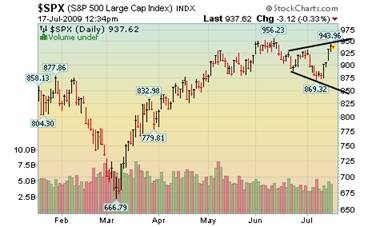 --U.S. stocks declined today, trimming the best weekly gain since March for the Standard & Poor’s 500 Index, as lower profit at General Electric Co. and slowing sales growth at Google Inc. offset a jump in housing starts. The mix of good news, then bad, is causing the S&P 500 to careen back and forth in an expanding pattern. This is very emotional and unstable, according to the experts. It is often viewed as a topping pattern, because of its volatility.
--U.S. stocks declined today, trimming the best weekly gain since March for the Standard & Poor’s 500 Index, as lower profit at General Electric Co. and slowing sales growth at Google Inc. offset a jump in housing starts. The mix of good news, then bad, is causing the S&P 500 to careen back and forth in an expanding pattern. This is very emotional and unstable, according to the experts. It is often viewed as a topping pattern, because of its volatility.
Treasury bonds slipped back this week.
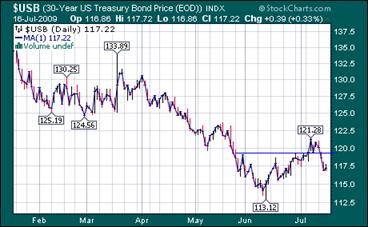 -- Treasuries fell, headed for their first weekly decline in six weeks, as housing starts in the U.S. unexpectedly rose in June, suggesting the market may be stabilizing and adding to signs the recession may be easing. Lower borrowing costs and plunging prices are making houses more affordable, alleviating the worst housing slowdown since the Great Depression. June’s increase in housing starts followed a 562,000 pace in May that was higher than previously estimated.
-- Treasuries fell, headed for their first weekly decline in six weeks, as housing starts in the U.S. unexpectedly rose in June, suggesting the market may be stabilizing and adding to signs the recession may be easing. Lower borrowing costs and plunging prices are making houses more affordable, alleviating the worst housing slowdown since the Great Depression. June’s increase in housing starts followed a 562,000 pace in May that was higher than previously estimated.
Is this a rally…or a pause in the decline?
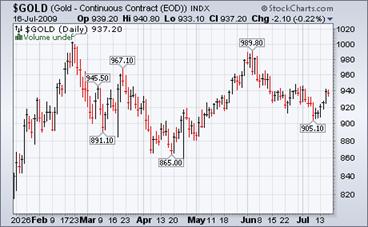 Gold advanced on rising demand for the precious metal as a hedge against inflation after U.S. housing starts increased in June, adding to signs the world’s biggest economy is stabilizing. Investment in the SPDR Gold Trust, the biggest exchange- traded fund backed by bullion, rose 0.3 metric ton to 1,094.85 tons as of yesterday, the company’s Web site showed.
Gold advanced on rising demand for the precious metal as a hedge against inflation after U.S. housing starts increased in June, adding to signs the world’s biggest economy is stabilizing. Investment in the SPDR Gold Trust, the biggest exchange- traded fund backed by bullion, rose 0.3 metric ton to 1,094.85 tons as of yesterday, the company’s Web site showed.
The Nikkei takes a break from the decline.
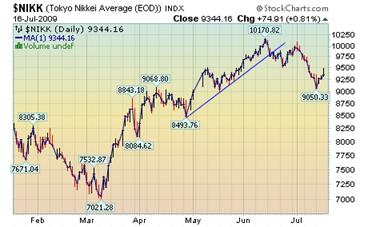 -- Japanese stocks rose, led by property developers, after Barclays Plc gave the industry a “positive” recommendation. Companies that generate most of their revenue domestically climbed as investors shied away from global risk. “Investors are not interested in taking on risk at the moment, which is why defensive, domestic stocks are getting a second look,” said Tomomi Yamashita, a Tokyo-based fund manager.
-- Japanese stocks rose, led by property developers, after Barclays Plc gave the industry a “positive” recommendation. Companies that generate most of their revenue domestically climbed as investors shied away from global risk. “Investors are not interested in taking on risk at the moment, which is why defensive, domestic stocks are getting a second look,” said Tomomi Yamashita, a Tokyo-based fund manager.
China’s market still strong.
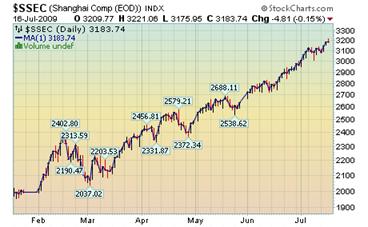 -- China’s stocks rose, driving the benchmark index to a fifth weekly gain, as signs of economic recovery spurred gains by raw-materials producers. Banks and automakers declined. The Shanghai Composite Index added 6, or 0.2 percent, to 3,189.74 at the close, the highest in 13 months. It’s risen 2.4 percent this week. A 75 percent rally in 2009 has driven stock valuations to 33.1 times earnings, the most since March 2008 figures.
-- China’s stocks rose, driving the benchmark index to a fifth weekly gain, as signs of economic recovery spurred gains by raw-materials producers. Banks and automakers declined. The Shanghai Composite Index added 6, or 0.2 percent, to 3,189.74 at the close, the highest in 13 months. It’s risen 2.4 percent this week. A 75 percent rally in 2009 has driven stock valuations to 33.1 times earnings, the most since March 2008 figures.
The dollar gets no respect.
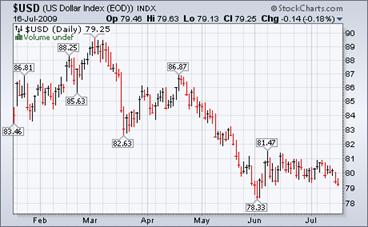 -- The dollar and the yen headed for the biggest weekly declines against the euro since May as U.S. housing starts rose and companies reported earnings that topped analysts’ estimates, boosting demand for higher-yielding assets. The proclivity toward risk taking may be misguided at this point in the economy and the market. Stocks are now heading into the three worst performing months of the year. This may help the dollar regain some respect.
-- The dollar and the yen headed for the biggest weekly declines against the euro since May as U.S. housing starts rose and companies reported earnings that topped analysts’ estimates, boosting demand for higher-yielding assets. The proclivity toward risk taking may be misguided at this point in the economy and the market. Stocks are now heading into the three worst performing months of the year. This may help the dollar regain some respect.
Housing starts are overwhelmed by foreclosures and defaults.
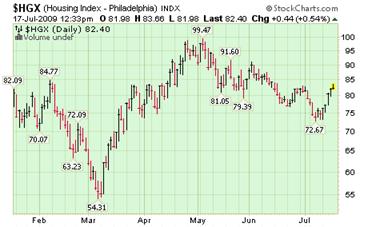 The foreclosure plague is not going away -- it's only getting worse. A record 1.53 million properties were in the foreclosure process -- default notices, auction sale notices and bank repossessions -- during the first six months of 2009. That was 9% more than the previous six months and 15% more than the same period of 2008, according to a report released Thursday by RealtyTrac. This is happening despite a foreclosure moratorium!
The foreclosure plague is not going away -- it's only getting worse. A record 1.53 million properties were in the foreclosure process -- default notices, auction sale notices and bank repossessions -- during the first six months of 2009. That was 9% more than the previous six months and 15% more than the same period of 2008, according to a report released Thursday by RealtyTrac. This is happening despite a foreclosure moratorium!
Gasoline prices down for three weeks in a row!
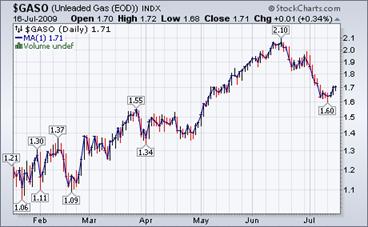 Energy Information Administration Weekly Report suggests that, “The U.S. average price for regular gasoline fell for the third week in a row, dropping eight cents to $2.53 per gallon. The price was $1.59 below last year. Prices decreased throughout the country, with the largest drop occurring in the Midwest. The price dipped seven cents on the East Coast to $2.53 per gallon. In the Midwest, the price plunged nearly 12 cents to $2.43 per gallon.” Note: The chart shows wholesale prices.
Energy Information Administration Weekly Report suggests that, “The U.S. average price for regular gasoline fell for the third week in a row, dropping eight cents to $2.53 per gallon. The price was $1.59 below last year. Prices decreased throughout the country, with the largest drop occurring in the Midwest. The price dipped seven cents on the East Coast to $2.53 per gallon. In the Midwest, the price plunged nearly 12 cents to $2.43 per gallon.” Note: The chart shows wholesale prices.
Natural gas prices still modest.
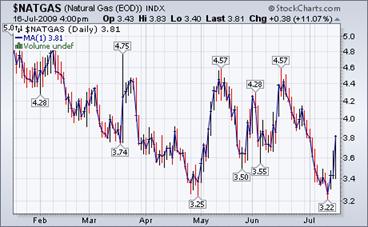 The Energy Information Agency’s Natural Gas Weekly Update reports, “Though price gains this week reversed losses from the previous week, prices in all trading locations are still relatively low. Year-to-date, prices at the Henry Hub have fallen 40 percent from $5.63 per MMBtu. The current Henry Hub price of $3.37 per MMBtu has declined 70 percent from the year-ago closing price of $11.15 per MMBtu. The WTI crude oil contract has similarly declined, falling 52 percent from the closing price of $129.43 per barrel 1 year ago. Price declines in the past year are likely the result of the declining economy, reduced demand, and robust inventories.”
The Energy Information Agency’s Natural Gas Weekly Update reports, “Though price gains this week reversed losses from the previous week, prices in all trading locations are still relatively low. Year-to-date, prices at the Henry Hub have fallen 40 percent from $5.63 per MMBtu. The current Henry Hub price of $3.37 per MMBtu has declined 70 percent from the year-ago closing price of $11.15 per MMBtu. The WTI crude oil contract has similarly declined, falling 52 percent from the closing price of $129.43 per barrel 1 year ago. Price declines in the past year are likely the result of the declining economy, reduced demand, and robust inventories.”
Can you trust this man?
 In a clear departure from the historical norm, the White House is not cheering the return of huge profits to Wall Street. On the contrary, the recent windfalls at Goldman Sachs and JPMorgan, and the promise of giant year-end paydays for banking executives and traders, has caused a bit of consternation in the West Wing, coming as it does so soon after the taxpayer bailouts saved the entire financial system from total collapse.
In a clear departure from the historical norm, the White House is not cheering the return of huge profits to Wall Street. On the contrary, the recent windfalls at Goldman Sachs and JPMorgan, and the promise of giant year-end paydays for banking executives and traders, has caused a bit of consternation in the West Wing, coming as it does so soon after the taxpayer bailouts saved the entire financial system from total collapse.
"If I were a Wall Street firm, I would perhaps be cognizant of the fact that the financial regulatory-reform process is only beginning in Congress," warns a senior White House official, speaking about the political problems that huge paydays at Wall Street firms could create later this year, when new laws to regulate the industry will be written on Capitol Hill. Officials have also begun to worry aloud whether the Wall Street firms learned anything from the catastrophic financial crisis that was largely of their making or whether they are now returning to the old business of making short-term profits that create long-term risks.
Our Investment Advisor Registration is on the Web
We are in the process of updating our website at www.thepracticalinvestor.com to have more information on our services. Log on and click on Advisor Registration to get more details.
If you are a client or wish to become one, please make an appointment to discuss our investment strategies by calling Connie or Tony at (517) 699-1554, ext 10 or 11. Or e-mail us at tpi@thepracticalinvestor.com .
Anthony M. Cherniawski,
President and CIO
http://www.thepracticalinvestor.com
As a State Registered Investment Advisor, The Practical Investor (TPI) manages private client investment portfolios using a proprietary investment strategy created by Chief Investment Officer Tony Cherniawski. Throughout 2000-01, when many investors felt the pain of double digit market losses, TPI successfully navigated the choppy investment waters, creating a profit for our private investment clients. With a focus on preserving assets and capitalizing on opportunities, TPI clients benefited greatly from the TPI strategies, allowing them to stay on track with their life goals
Disclaimer: The content in this article is written for educational and informational purposes only. There is no offer or recommendation to buy or sell any security and no information contained here should be interpreted or construed as investment advice. Do you own due diligence as the information in this article is the opinion of Anthony M. Cherniawski and subject to change without notice.
Anthony M. Cherniawski Archive |
© 2005-2022 http://www.MarketOracle.co.uk - The Market Oracle is a FREE Daily Financial Markets Analysis & Forecasting online publication.



